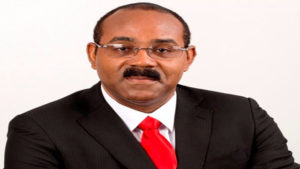 Despite the debilitating economic impacts of the Covid-19 pandemic, Prime Minister Gaston Browne said there is still some time before Antigua and Barbuda would need financial assistance from the International Monetary Fund (IMF).
Despite the debilitating economic impacts of the Covid-19 pandemic, Prime Minister Gaston Browne said there is still some time before Antigua and Barbuda would need financial assistance from the International Monetary Fund (IMF).
Browne, who also serves as the nation’s finance minister, told Observer that while to date the Cabinet has not decided on entering an IMF programme, the country and the financial agency are closer to having a more tailored funding programme, should the need arise.
“We recognise that if the situation persists for nearly another year or two, then we could end up in a situation in which we have no other choice but to go to the IMF,” he said.
“But what I can say to you is that our discussions, which are actually taking place with the IMF, have actually yielded quite good results in terms of the terms.”
Browne, who has been a strong critic of the IMF and other international financial institutions, has often demanded improved financial facilities for small and vulnerable economies, including the suspension of per capita income as a criterion for concessional financing; debt relief including suspension of debt payments; write-offs of old debts, particularly by the Paris Club; and budgetary support through a mix of grants and low-cost loans on a country-by-country basis.
Browne said that the government has made it clear that if they were to enter an IMF programme, it would be a homegrown, “bespoke” plan instead of a “one size fits all” proposal “which would have hurt a number countries, even though the intent of the IMF was good”.
He said the government has since “made it clear” to the financial agency that there will be no retrenchment of workers if they were to access funding, a measure, he says, that did not receive any push back.
According to the country’s leader, the government has also indicated that instead of accessing short or medium-term funding, it is hoping to get a loan that would mature in 14-15 years instead, with one per cent interest.
Speaking during the recent ‘Summit of 40 Leaders’ on climate change, Browne told his global counterparts that the repayment of official debt by small states, including to the Paris Club, is near impossible in the prevailing parlous circumstances.
He said that the government has indicated to the IMF that there should also be no precondition for the repayment of the country’s decades-old Paris Club debt.
“We want the opportunity to negotiate with the Paris Club, a partial reduction in the debt,” the prime minister said, noting that the debt now stands at about US$160 million.
He said this proposal has also been met with “good support”.
The Paris Club comprises a group of officials from major creditor countries whose role is to find co-ordinated and sustainable solutions to the payment difficulties experienced by debtor countries.
In April 2020, the IMF announced the approval of three requests from Dominica, Grenada, and St Lucia for emergency financial assistance to help address the challenges posed by Covid-19.
The approval made a combined US$65.6 million in emergency financing available to help the three Eastern Caribbean Currency Union member states
